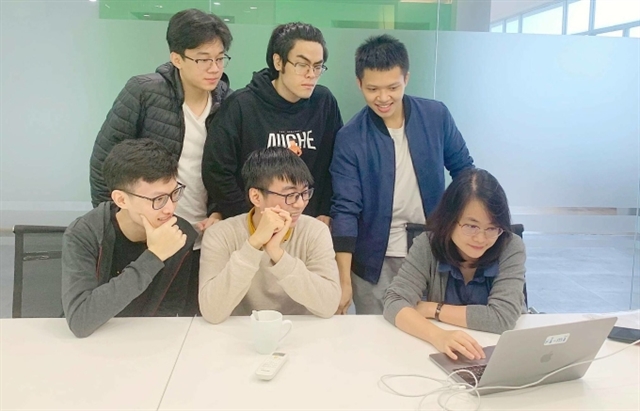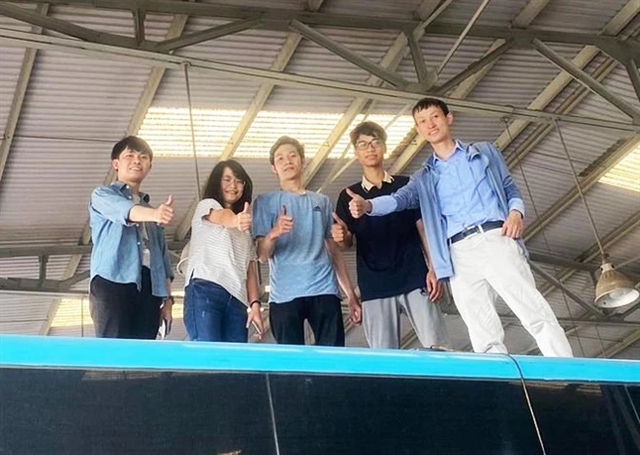
|
| Associate Professor Nguyễn Phi Lê (first from right) at a discussion with her students. Photo courtesy of Nguyễn Phi Lê |
HÀ NỘI – After several years studying in Japan with excellent academic achievements, Associate Professor Nguyễn Phi Lê surprised others by refusing an offer to become a lecturer at a university in Osaka, deciding instead to return to Việt Nam to teach and inspire students passionate in scientific research.
The 42-year-old woman is now working as the managing director of the International Research Centre for Artificial Intelligence (BKAI) and as lecturer at the School of Information and Communications Technology, Hanoi University of Science and Technology.
She won the silver medal at the International Mathematical Olympiad in 2000, being then the 11th female student in Việt Nam to win a Olympiad medal in history.
Being awarded a Japanese Government scholarship, Lê followed the electronics bachelor programme at Tokyo University, graduated with excellent results and was admitted directly into the master’s programme.
While studying for her doctorate, she continued to reap many achievements such as being recognised as the best student at the Japan Institute of Informatics in 2018 and having excellent articles at scientific conferences.
In spite of this impressive personal profile, she turned down the opportunity to become a lecturer at a university in Japan to return to Việt Nam.
Before defending her doctoral thesis at the National Institute of Informatics in Japan, Lê received an offer to become a lecturer at a university in Osaka, such a rare opportunity that Lê’s Japanese instructor advised her to take serious consideration.
“If I stayed, the things I would do in Japan could be done by many other people. In Việt Nam, there are not many lecturers who actually pursue the research path, spend time and enthusiasm instructing and passing on passion to young people. If I return to my country, I can help students discover and develop their own research abilities,” she told Vietnamnet.
She said the Information technology industry was different from some other industries. People in this field could work remotely and would not be too dependent on expensive materials and machinery.
“Of course, research conditions in Việt Nam may not be as good as abroad, but I always keep in mind that no matter the situation, we need to try to do the best in that situation.”
In 2019, she decided to return home after completing her doctoral programme. In the early stages of establishing a research group, the biggest difficulty was shortage of human resources.
The female lecturer called for the participation of qualified students, focusing on problems related to the Internet of Things (IoT), specifically applying reinforcement learning to energy optimisation problems in wireless sensor networks.

|
| Associate Professor Nguyễn Phi Lê (second from left) and her colleagues and students launched Fi-Mi, an AI application system device that collects data and forecasts air quality on the buses of Hanoi Transport Corporation (Transerco). Photo courtesy of Nguyễn Phi Lê |
After working on theoretical problems, Associate Professor Lê changed direction, focusing more on highly applicable research, directly solving problems that have great impacts on society such as the environment and health.
“The more I do research, the more I understand that the highest purpose of science is to serve people. I want to do the research that solves the country’s practical problems,” she said.
Now her research team has been joined by about 30 talented students from the School of Information and Communications Technology, Hanoi University of Science and Technology.
Some students at first did not intend to continue studying after university, but only applied to join a lab to get acquainted with research. However, after a while, the students changed direction and decided to continue studying.
“There are also students who have research ability but their talent has not yet awakened. After doing the research, they gradually love it and can expand their future career orientation,” she said.
One thing Lê does regret is that during her time in Japan, she only focused on studying so she did not have many outside experiences.
“At that time, I believed that if you study, you must study seriously. So, for 28 years, I just learned and learned.”
She cherishes memories of her high school time when she was a math student at the Lam Sơn High School for Gifted Students in Thanh Hóa Province.
“Maths taught me to keep patient and never give up on a difficult problem. Instead of giving up, I often try to seek solutions even though it may take a few days or even weeks.
“I always have questions in my mind about the things I’m worried about and want to solve them. That has become a habit and helped me a lot in scientific research,” she said.
“I think that when doing research, being serious, diligent and disciplined is not enough. If you don’t have curiosity and the desire to solve problems to the end, it will be very difficult to succeed,” she said. VNS
- Reduce Hair Loss with PURA D’OR Gold Label Shampoo
- Castor Oil Has Made a “Huge” Difference With Hair and Brow Growth
- Excessive hair loss in men: Signs of illness that cannot be subjective
- Dịch Vụ SEO Website ở Los Angeles, CA: đưa trang web doanh nghiệp bạn lên top Google
- Nails Salon Sierra Madre
 VnExpress News The News Gateway of Vietnam
VnExpress News The News Gateway of Vietnam





